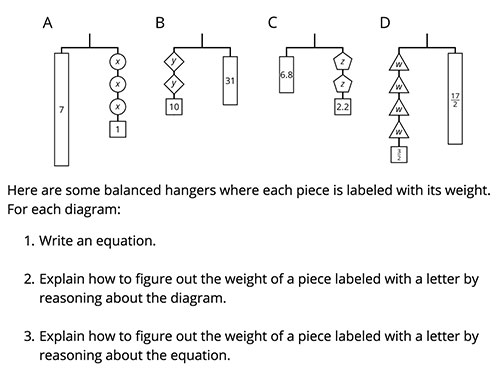How can teachers tell if a student struggling to solve a mathematics problem is productively moving toward a solution or just spinning their wheels? Teachers wrestling with the complex realities of productive struggle in the classroom must ask themselves important questions, such as what do I do if a student is completely stuck? What if they give up? What questions do I ask? Is there a time when just telling a student something is appropriate? How much help is too much or too little?
An important guiding principle in answering these questions is knowing when the struggle is related to the activity's goal. The ability to judge whether each student's struggle is related or not involves planning. Let's look at how that planning might work with an example from the Illustrative Mathematics (IM) 6–8 math curriculum.

Step 1: Understand the activity's goal within a lesson.
The lesson's goal is for students to see how a balanced hanger is like an equation and how moving its weights is like solving the equation. As you do the math, take a moment to consider what students need to know at the end of this activity to support the goal. How will future learning experiences build on this one?
Step 2: Anticipate student responses.
Think about the diverse mathematical understandings and experiences students have had and anticipate their varying responses to the activity's questions. As you anticipate their strategies, consider how students might explain their actions. How might they productively struggle? What would unproductive struggle look like in this activity?
Step 3: Plan how you will launch the activity.
There is a delicate balance between offering helping and asking questions that grant students access to the answers without reducing mathematical cognitive demand. For example, it would discourage productive struggle to launch the activity by showing students a similar problem with a strategy for solving two-step equations.
As you reflect on what students may do during the activity, consider what part of the activity students should productively struggle with as they move toward a solution. What piece of the activity might students find inaccessible? How can you launch this activity without taking away the problem students need to grapple with to learn?
Step 4: Decide whether to redirect, provide support, or let it go.
Because we want all students to succeed in our mathematics classes, our inclination is to provide hints or help until they get a correct answer. When we step back and look at who did all of the work, however, we don't want it to be the teacher. Students could struggle productively or unproductively in varying ways, and each case requires a different instructional move.
Going back to the example above, a student working on the second hanger may be discussing with their peer whether the weight has to represent a whole number. Since it is important for students to learn that the equation's solution is the number that makes the equation true, whether or not it is a whole number, this would be an example of productive struggle. In this case, the teacher should let the students continue their discussion but prompt them to try the third and fourth hanger to compare the values of the variables in each one.
Another student working on the fourth hanger could be removing the same amount of weight from both sides of the hanger but struggling to divide up the remaining weight of the four w's because the fraction is represented in halves. The teacher could redirect their thinking by asking if they can write 14/2 as a whole number. In this case, the suggestion to work with whole numbers may be the nudge the student needs to move past the unproductive struggle. Since the activity's goal is to think of a strategy for finding a missing weight, that redirection is not reducing the relevant demand of the task.
Step 5: Reflect on what you did well and what improvements you would make next time.
Count your victories. Where did you support productive struggle? When could you have asked a better question? How can you improve upon your commitment to support students as they make sense of problems and persevere in solving them?
In deciding when and how to intervene when students are struggling, the overriding consideration is how their struggle relates to the lesson's goals. Maintain a clear picture of those goals and continually evaluate how students are progressing toward them. Struggle unrelated to the learning goal is often unproductive, but we don't want to take away productive opportunities to struggle when it will help students move along the established curricular progression and strengthen future learning.




